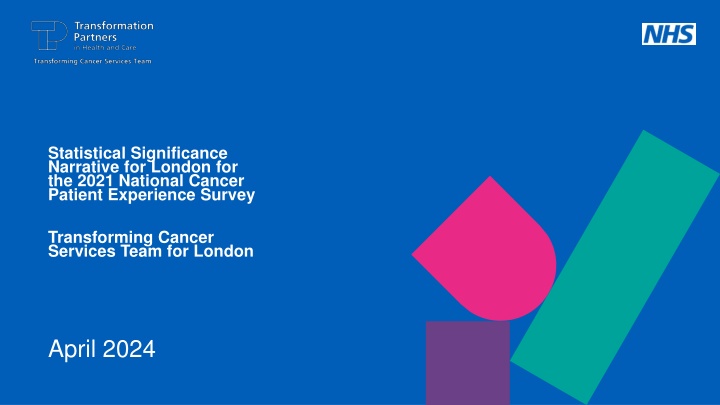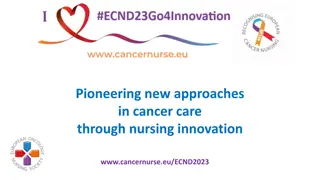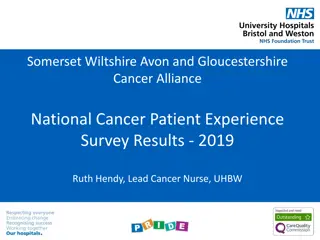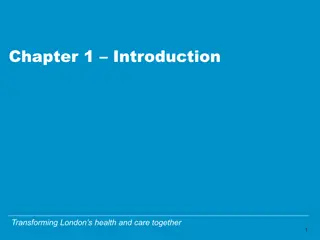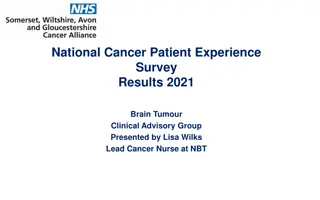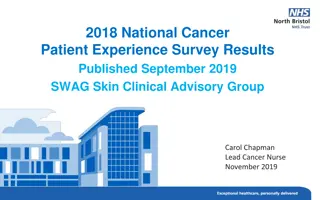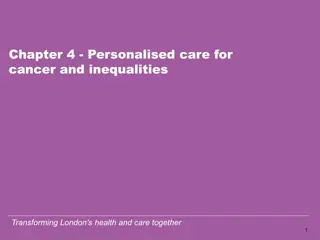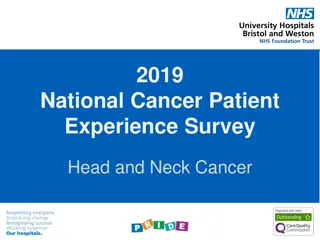Statistical Significance Narrative for London Cancer Care Survey 2021
The 2021 National Cancer Patient Experience Survey in London compared against England scores provides insights on various aspects of cancer care services. The survey involved 134 NHS trusts and received responses from 59,352 individuals. Statistical significance analysis highlights differences between London and England in areas such as support from healthcare professionals, diagnostic tests, treatment decisions, care planning, and hospital care. The findings aim to drive local quality improvements and inform stakeholders supporting cancer patients.
Download Presentation

Please find below an Image/Link to download the presentation.
The content on the website is provided AS IS for your information and personal use only. It may not be sold, licensed, or shared on other websites without obtaining consent from the author.If you encounter any issues during the download, it is possible that the publisher has removed the file from their server.
You are allowed to download the files provided on this website for personal or commercial use, subject to the condition that they are used lawfully. All files are the property of their respective owners.
The content on the website is provided AS IS for your information and personal use only. It may not be sold, licensed, or shared on other websites without obtaining consent from the author.
E N D
Presentation Transcript
Statistical Significance Narrative for London for the 2021 National Cancer Patient Experience Survey Transforming Cancer Services Team for London April 2024
Introduction Introduction The Cancer Patient Experience Survey 2021 is the eleventh iteration of the survey first undertaken in 2010. It has been designed to monitor national progress on cancer care; to provide information to drive local quality improvements; to assist commissioners and providers of cancer care; and to inform the work of the various charities and stakeholder groups supporting cancer patients. In this slide deck we have used statistical significance information to summarise the difference between London scores and England scores on the NCPES survey. The 2021 survey involved 134 NHS trusts. Out of 107,412 people, 59,352 people responded to the survey, yielding a response rate of 55%. To view the 2021 questionnaire, survey guidance, survey materials and the scoring document, please visit the website. All Excel data tables and PDF reports from the survey are also published on the website: https://www.ncpes.co.uk/supporting-documents Please contact chipo.chirewa@nhs.net for further information.
Questions (2 Questions (2- -36) 36) Section Support from your GP Practice Support from your GP Practice Diagnostic tests Diagnostic tests Diagnostic tests Diagnostic tests Diagnostic tests Finding out that you had cancer Finding out that you had cancer Finding out that you had cancer Finding out that you had cancer Finding out that you had cancer Support from a main contact person Support from a main contact person Support from a main contact person Deciding on the best treatment Deciding on the best treatment Deciding on the best treatment Deciding on the best treatment Care planning Care planning Care planning Support from hospital staff Support from hospital staff Support from hospital staff Hospital care Hospital care Hospital care Hospital care Hospital care Hospital care Question Q02 Patient only spoke to primary care professional once or twice before cancer diagnosis Q03 Referral for diagnosis was explained in a way the patient could completely understand Q05 Patient received all the information needed about the diagnostic test in advance Q06 Diagnostic test staff appeared to completely have all the information they needed about the patient Q07 Patient felt the length of time waiting for diagnostic test results was about right Q08 Diagnostic test results were explained in a way the patient could completely understand Q09 Enough privacy was always given to the patient when receiving diagnostic test results Q12 Patient was told they could have a family member, carer or friend with them when told diagnosis Q13 Patient was definitely told sensitively that they had cancer Q14 Cancer diagnosis explained in a way the patient could completely understand Q15 Patient was definitely told about their diagnosis in an appropriate place Q16 Patient was told they could go back later for more information about their diagnosis Q17 Patient had a main point of contact within the care team Q18 Patient found it very or quite easy to contact their main contact person Q19 Patient found advice from main contact person was very or quite helpful Q20 Treatment options were explained in a way the patient could completely understand Q21 Patient was definitely involved as much as they wanted to be in decisions about their treatment Q22 Family and/or carers were definitely involved as much as the patient wanted them to be in decisions about treatment options Q23 Patient could get further advice or a second opinion before making decisions about their treatment options Q24 Patient was definitely able to have a discussion about their needs or concerns prior to treatment Q25 A member of their care team helped the patient create a care plan to address any needs or concerns Q26 Care team reviewed the patient's care plan with them to ensure it was up to date Q27 Staff provided the patient with relevant information on available support Q28 Patient definitely got the right level of support for their overall health and well being from hospital staff Q29 Patient was offered information about how to get financial help or benefits Q31 Patient had confidence and trust in all of the team looking after them during their stay in hospital Q32 Patient's family, or someone close, was definitely able to talk to a member of the team looking after the patient in hospital Q33 Patient was always involved in decisions about their care and treatment whilst in hospital Q34 Patient was always able to get help from ward staff when needed Q35 Patient was always able to discuss worries and fears with hospital staff Q36 Hospital staff always did everything they could to help the patient control pain 3
Questions (37 Questions (37- -59) 59) Section Hospital care Hospital care Hospital care Your treatment Your treatment Your treatment Your treatment Your treatment Your treatment Your treatment Your treatment Your treatment Your treatment Your treatment Immediate and long term side effects Q44 Possible side effects from treatment were definitely explained in a way the patient could understand Immediate and long term side effects Q45 Patient was always offered practical advice on dealing with any immediate side effects from treatment Immediate and long term side effects Q46 Patient was given information that they could access about support in dealing with immediate side effects from treatment Immediate and long term side effects Q47 Patient felt possible long-term side effects were definitely explained in a way they could understand in advance of their treatment Immediate and long term side effects Q48 Patient was definitely able to discuss options for managing the impact of any long-term side effects Support while at home Q49 Care team gave family, or someone close, all the information needed to help care for the patient at home Support while at home Q50 During treatment, the patient definitely got enough care and support at home from community or voluntary services Care from your GP Practice Q51 Patient definitely received the right amount of support from their GP practice during treatment Care from your GP Practice Q52 Patient has had a review of cancer care by GP practice Living with and beyond cancer Q53 After treatment, the patient definitely could get enough emotional support at home from community or voluntary services Living with and beyond cancer Q54 The right amount of information and support was offered to the patient between final treatment and the follow up appointment Living with and beyond cancer Q55 Patient was given enough information about the possibility and signs of cancer coming back or spreading Your overall NHS care Q56 The whole care team worked well together Your overall NHS care Q57 Administration of care was very good or good Your overall NHS care Q58 Cancer research opportunities were discussed with patient Your overall NHS care Q59 Patient's average rating of care scored from very poor to very good Question Q37 Patient was always treated with respect and dignity while in hospital Q38 Patient received easily understandable information about what they should or should not do after leaving hospital Q39 Patient was always able to discuss worries and fears with hospital staff while being treated as an outpatient or day case Q41_1 Beforehand patient completely had enough understandable information about surgery Q41_2 Beforehand patient completely had enough understandable information about chemotherapy Q41_3 Beforehand patient completely had enough understandable information about radiotherapy Q41_4 Beforehand patient completely had enough understandable information about hormone therapy Q41_5 Beforehand patient completely had enough understandable information about immunotherapy Q42_1 Patient completely had enough understandable information about progress with surgery Q42_2 Patient completely had enough understandable information about progress with chemotherapy Q42_3 Patient completely had enough understandable information about progress with radiotherapy Q42_4 Patient completely had enough understandable information about progress with hormone therapy Q42_5 Patient completely had enough understandable information about progress with immunotherapy Q43 Patient felt the length of waiting time at clinic and day unit for cancer treatment was about right 4
Overall Statistical Differences Overall Statistical Differences We found that in most questions (79%) London s score was significantly lower than the England position In only 5% of the questions was London s score significantly higher than the England position Characteristics In half the NCPES questions there was a significant difference between London ethnic minorities and London white populations. In most of these questions, but not all, that experience was worse for the London ethnic minorities population. In three quarters of the questions there was no significant difference between London most deprived and London least deprived. Where there was a difference most questions showed a poorer experience for the most deprived population. In one third of questions (21 questions) London most deprived scored significantly worse than England. In only 3 questions did London s most deprived score better than England most deprived. In 95% of questions there was no significant difference between London LQBTQ+ population and the heterosexual population in London. Nationally there was significantly worse experience for LQBTQ+ patients than heterosexual patients in half of the questions in the survey. In every age group there are some questions were the London scores are significantly lower than the England scores and very few questions where London scored better. This is particularly the case in the 65-74 group where 62% of questions scored worse in London and one question (2%) scored better in London than in England.
Support from your GP Practice (Q2-3) Q2 was seen in the ethnic minorities population, themost deprived population and age groups 45- 54, 55-64, 65-74, 75-84. Overall London s population had a statistically significantly worse experiencethan England s when speaking to a primary care professional once or twicebefore cancer diagnosis. This experience Q3 regards to how a referral for diagnosis was explained in away the patient could completely understand. This experience was seen in theethnic minorities population, the most deprived population and age groups 45- 54, 55-64, 65-74, 75-84 and 85+. Overall London s population had a statistically significantly worse experience than England s in Whilst further evidence is required this analysis implies that patients in London for the aforementioned groups feel less supported by their GP Practice than the same groups across England.
Diagnostic tests (Q5-9) Q5 receiving all the information needed abouttheir diagnostic test in advance. This experience was seen in 45-54 group. The LGBTQ+population in London had a statistically significantly better experience than the England LGBTQ+ population. Overall London s population had a statistically significantly worse experiencethan England s population in Q6 Overall London s population had a statistically significantly worse experiencethan England s population in the area of diagnostic test staff appearing tocompletely have all the information they needed about the patient. This experience was seen in the ethnic minorities, most deprived populations and age groups 25-34, 45-54, 55-64, 65-74, 75-84 and 85+. Q7 Overall London s population had a statistically significantly worse experiencethan England s population in regards to they felt the length of timewaiting for diagnostic test results was about right. This experience was seen in the most deprived population and age groups 16-24 and 45-54. Q8 Overall London s population had a statistically significantly worse experiencethan England s population in regards to how they felt diagnostic test results were explained in a way they could completely understand. This experience was seen in the most deprived population and age groups 35-44, 45-54, 55-64 and 65-74. Q9 Overall London s population had a statistically significantly worse experiencethan England s population in regards to how they felt about enough privacy always been given to them when receiving diagnostic test results. This experience was seen in the most deprived population and age groups 45-54 and 65-74. Whilst further evidence is required this analysis implies that patients in London for who are most deprived, ethnic minorities or
Finding out you had cancer (Q12-16) Q12 Overall London s population had a statistically significantly worse experience than England s population in regards to whether they were told they could have a family member, carer or friend with them when told their diagnosis. This experience was seen in the age group 75-84. Q13 Overall London s population had a statistically significantly worse experience than England s population in regards to whether they thought they were definitely told sensitively that they had cancer. This experience as seen in the age group 65-74. Q14 Overall London s population had a statistically significantly worse experience than England s population in regards to whether they felt their cancer diagnosis was explained in a way the patient could completely understand. This experience was seen in the age group 65-74 and in the most deprived population. Q15 There was no statistical difference between London and England on whether a patient was definitely told about their diagnosis in an appropriate place. Q16 Overall London s population had a statistically significantly worse experience than England s population in regards to whether they felt they were told they could go back later for more information about their diagnosis. This experience was seen in the age groups 45-54, 55-64, 65-74 and 85+. Whilst further evidence is required this analysis implies that patients overall in London and for those who are most deprived and for the ages shown above report worse scores for the finding out you had cancer part of their pathway than the same groups across England.
Support from a main contact person (Q17-19) Analysis shows that for the following groups: overall, age, deprivation and sexual orientation there is a statistical significance in score between London and England. Q17 Overall London s population had a statistically significantly worse experience than England s population in regards to how they felt about whether they had a main point of contact within the care team. This experience was seen in the ethnic minorities and most deprived population as well as age groups 25-34 and 45-54. Q18 Overall London s population had a statistically significantly worse experiencethan England s population in regards to how easy they found it to contact their main contact person. This experience was seen in the ethnic minorities and most deprived population as well as age groups 45-54, 55-64, 65-74, 75-84 and 85+. Q19 Overall London s population had a statistically significantly worse experiencethan England s population in regards to if they found advice from their main contact person was very or quite helpful. This experience was seen in age groups 65-74 and 75-84. Whilst further evidence is required this analysis implies that patients overall in London and for those who are most deprived and for the ages shown above report worse scores for the finding out you had cancer part of their pathway than the same groups across England.
Deciding on best treatment (Q20-23) Q20 white and ethnic minorities both nationally and regionally, where ethnic minorities scored worse. There is a significant difference in how treatment options were explained and understood between the most deprived (lower score) and the least deprived both in London and in England. There is a significant difference in how treatment options were explained and understood between Q21 between white and ethnic minorities both nationally and regionally, where ethnic minorities scored lower. The most deprived in London scored significantly lower when compared to the most deprived in England. 55-84 years scored significantly lower in London than England. There is a significant difference in how much patients were involved in treatment decisions Q22 in decisions about treatment options There was no statistical difference between London and England on family and carer involvement Q23 ethnic minorities both nationally and regionally, where ethnic minorities scored higher. There is a significant difference in getting further advice or second opinions between white and In terms of decisions on treatment most deprived patients scored statistically lower in London than in England, ethnic minorities patients scored higher on one question and lower on two questions in London.
Care Planning (Q24-26) Q24 In London, compared to the rest of England, being able to have a discussion about their needs was worse for those from the most deprived areas, and for those who identified as LGBTQ+ compared to heterosexual. Q25 The experience of being helped to create a care plan was worse for younger people (aged 16-24), and for those who were much older (aged 85+) Q26 The experience of having the care plan reviewed was also worse for those over 65 and for those who identified as LGBTQ+. There is a significant difference between London and England across all 3 questions related to personalised care and support planning. Those in London have a poorer experience than those in the rest of England across all of these questions.
Support from Hospital Staff(Q27-29) Q27 information about support available compared to the England ethnic minorities population. Deprivation did not make a significant difference to patients receiving information about support available in London. Patients over 65 in London have a worse experience of receiving information about support compared to those living in England The London ethnic minorities population had a statistically worse experience of receiving Q28 of support for their overall health and wellbeing than the England ethnic minorities population and also worse deprived, and also lower scores than London least deprived. A number of age groups in London also reported lower scores than in England (16-54 and also 65-74) The London ethnic minorities population had a statistically worse experience of getting right level Q29 how to get financial help or benefits than the London white population. A number of age groups also reported statistically worse experience than England (16-24, 45-54, 65-84). Deprivation did not make a statistical difference. The London ethnic minorities population reported statistically worse experience on information on Overall the ethnic minorities population generally reported worse experience in support from hospital staff than white patients in London. The most deprived patients saw statistically lower scores in one of the three
Hospital care (Q31-35) Q31 Overall London s population had a statistically significantly worse experiencethan England s population in regards to the confidence and trust they had in all of the team looking after them during their stay in hospital. This experience was seen in the age group 75-84. Q32 Overall London s population had a statistically significantly worse experiencethan England s population in regards to them feeling that a family, or someone close, was definitely able to talk to a member of the team looking after the patient in hospital. Q33 There was no statistical difference between London s and England s population in regards to patients being always involved in decisions about their care and treatment whilst in hospital. Q34 population in regards to them feeling that they were always able to get help from ward staff when needed. This experience was seen in the age group 65-74. Overall London s population had a statistically significantly worse experiencethan England s Q35 population in regards always being able to discuss worries and fears with hospital staff. This experience was seen in the most deprived population and in the age group 65-74 Overall London s population had a statistically significantly worse experiencethan England s Whilst further evidence is required this analysis implies that patients overall in London and for those who are most deprived and for the ages shown above report worse scores for the hospital care part of their pathway than the same groups across England.
Hospital care (Q36-39) Q36 Overall London s population had a statistically significantly worse experiencethan England s population in regards to hospital staff always did everything they could to help the patient control pain. This experience was seen in the age group 85+. Q37 Overall London s population had a statistically significantly worse experiencethan England s population in regards to patient was always treated with respect and dignity while in hospital. This experience was seen in the ethnic minorities and 75-84. population and in the age groups 55-64, 65-74 Q38 population in regards to patient received easily understandable information about what they should or should not do after leaving hospital. This experience was seen in the age groups 35-44 and 75-84. Overall London s population had a statistically significantly worse experiencethan England s Q39 Overall London s population had a statistically significantly worse experiencethan England s population in regards to patient was always able to discuss worries and fears with hospital staff while being treated as an outpatient or day case. population and in the age groups 45-54, 55-64, 65-74, 75-84. This experience was seen in the most deprived Whilst further evidence is required this analysis implies that patients overall in London and for those who are most deprived and for the ages shown above report worse scores for the hospital care part of their pathway
Your treatment(Q41) Q41_1 Overall London s population had a statistically significantly worse experiencethan England s population in regards to they felt that beforehand they completely had enough understandable information about surgery. This experience was seen in the age groups 25-34 and 65-74. Q41_2 Overall London s population had a statistically significantly worse experiencethan England s population in regards to them feeling that beforehand they completely had enough understandable information about chemotherapy. This experience was seen in the age group 65-74. Q41_3 Overall London s population had a statistically significantly worse experiencethan England s population in regards to them feeling that beforehand they completely had enough understandable information about radiotherapy. Q41_4 There was no statistical difference between London s and England s population in regards to beforehand they completely had enough understandable information about hormone therapy. Q41_5 Overall London s population had a statistically significantly worse experiencethan England s population in regards to them feeling that beforehand they completely had enough understandable information about immunotherapy. This experience was seen in London s most deprived population and in the age group 65-74. Whilst further evidence is required this analysis implies that patients overall in London and for those who are most deprived and for the ages shown above report worse scores for the your treatment part of their pathway than the same groups across England.
Your treatment(Q42-43) Q42_1 Overall London s population had a statistically significantly worse experiencethan England s population in regards to them feeling that they completely had enough understandable information about progress with surgery. This experience was seen in the age group 65-74. Q42_2 There was no statistical difference between London s and England s overall population in regards to them feeling they had completely had enough understandable information about progress with chemotherapy. London s age group 65-74 population had a statistically significantly worse experience than England s population of the same age group. Q42_3 There was no statistical difference between London s and England s overall population in regards to them feeling they completely had enough understandable information about progress with radiotherapy. Q42_4 There was no statistical difference between London s and England s overall population in regards to them feeling they completely had enough understandable information about progress with hormone therapy. Q42_5 There was no statistical difference between London s and England s overall population in regards to the feeling they completely had enough understandable information about progress with immunotherapy. Q43 Overall London s population had a statistically significantly worse experiencethan England s population in regards to them feeling the length of waiting time at clinic and day unit for cancer treatment was about right. This experience was seen in the ethnic minorities and most deprived populations. The age groups 35-44, 45-54, 55-64, 65-74, 75-84 and 85+. Whilst further evidence is required this analysis implies that patients overall in London, ethnic minorities, for those who are most deprived and for the ages shown above report worse scores for the your treatment part of their pathway than the same groups across England.
Immediate and long term side effects(Q44-48) Q44 Overall London s population had a statistically significantly worse experiencethan England s population in regards to possible side effects from treatment were definitely explained in a way the patient could understand. This experience was seen in the age groups 65-74 and 85+. Q45 Overall London s population had a statistically significantly worse experiencethan England s population in regards to patient was always offered practical advice on dealing with any immediate side effects from treatment. This experience was seen in the ethnic minorities and most deprived populations and the age group 65-74. Q46 Overall London s population had a statistically significantly worse experiencethan England s population in side effects from treatment. This experience was seen in the age groups 35-44, 65-74 and 75-84. Q47 Overall London s population had a statistically significantly worse experiencethan England s population in regards to patient felt possible long-term side effects were definitely explained in a way they could understand in advance of their treatment. This experience was seen in the age groups 65-74 and 85+. Q48 Overall London s population had a statistically significantly worse experiencethan England s population in regards to patient was definitely able to discuss options for managing the impact of any long-term side effects. This experience was seen in the ethnic minorities populations and the age groups 16-24, 65-74 and 85+. Whilst further evidence is required this analysis implies that patients overall in London, ethnic minorities, for those who are most deprived and for the ages shown above report worse scores for the immediate and long term side effects part of their pathway than the same groups across England.
Support while at home(Q49-50) Q49 There was no statistical difference between London s and England s population in regards to the care team gave family, or someone close, all the information needed to help care for the patient at home. There was a statistical difference between London s and England s ethnic minorities population. Q50 Overall London s population had a statistically significantly worse experiencethan England s population in regards to during treatment, the patient definitely got enough care and support at home from community or voluntary services. This experience was seen in the ethnic minorities and most deprived populations and the age groups 45-54, 55-64, 65-74 and 75-84. Whilst further evidence is required this analysis implies that patients overall in London, ethnic minorities, for those who are most deprived and for the ages shown above report worse scores for the immediate and long term side effects part of their pathway than the same groups across England.
Care from your GP Practice(Q51-52) Q51 Overall London s population had a statistically significantly worse experiencethan England s population in regards to patient definitely received the right amount of support from their GP practice during treatment . This experience was seen in the age groups 16-24, 25-34 and 45- 54. Q52 Overall London s population had a statistically significantly worse experiencethan England s population in regards to patient has had a review of cancer care by GP practice. This experience was seen in the most deprived population and the age group 55-64. Whilst further evidence is required this analysis implies that patients overall in London, for those who are most deprived and for the ages shown above report worse scores for the immediate and long term side effects part of their pathway than the same groups across England.
Living with and beyond cancer(Q53-55) Q53 Overall London s population had a statistically significantly worse experiencethan England s population in regards to after treatment, the patient definitely could get enough emotional support at home from community or voluntary services . This experience was seen in the most deprived population and the age groups 65-74 and 75-84. Q54 Overall London s population had a statistically significantly worse experiencethan England s population in regards to the right amount of information and support was offered to the patient between final treatment and the follow up appointment . This experience was seen in the age groups 65-74 and 85+. The LGBTQ+ population had a statistically significantly better experience than England s population. Q55 Overall London s population had a statistically significantly worse experiencethan England s population in regards to patient was given enough information about the possibility and signs of cancer coming back or spreading . This experience was seen in the age groups 65-74 and 85+. Whilst further evidence is required this analysis implies that patients overall in London, LGBTQ+ population, for those who are most deprived and for the ages shown above report worse scores for the immediate and long term side effects part of their pathway than the same groups across England.
Your overall NHS care (Q56-59) Q56 Overall London s population had a statistically significantly worse experiencethan England s population in regards to the whole care team worked well together. This experience was seen in the age group 75-84. Q57 Overall London s population had a statistically significantly worse experiencethan England s population in regards to administration of care was very good or good. This experience was seen in the most deprived population and the age groups 45-54 and 65-74. Q58 Overall London s population had a statistically significantly better experiencethan England s population in regards to cancer research opportunities were discussed with patient. This experience was seen in the ethnic minorities, most deprived and LGBTQ+ populations and age groups 45-54, 55-64, 65-74 and 75-84. Q59 Overall London s population had a statistically significantly worse experiencethan England s population in regards to patient's average rating of care scored from very poor to very good. This experience was seen in the most deprived population and the age groups 45-54, 55-64 and 65-74. Whilst further evidence is required this analysis implies that patients overall in London, ethnic minorities , LGBTQ+ population, for those who are most deprived and for the ages shown above report worse scores
ANNEX ANNEX - - Statistical Information Statistical Information Sub-group comparisons on scores for each scored question: Sexual orientation: significance tests indicate any differences between heterosexual and LGBTQ+ groups for both London and England, and also for LGBTQ+ respondents between London and England Ethnicity: significance tests indicate any differences between ethnic minorities and white groups for both London and England, and also for ethnic minority respondents between London and England IMD quintile: significance tests indicate any difference between the least deprived (quintile 5) and the most deprived (quintile 1) for both London and England, and also for the most deprived quintile between London and England Age: significance tests indicate any differences between London and England for each of the eight age groups A z-test of proportions (95% confidence level) was used to test whether there is a significant difference between the scores of two groups for all scored questions aside from Q59 A two-sample t-test (95% confidence level) was used to compare the mean score from Q59 (overall experience question) Question comparability The questionnaire was redeveloped for the 2021 Cancer Patient Experience Survey. Due to the significant changes made to the questionnaire no trend data or year on year comparisons are presented in results. Question-level suppression If any group within a particular sub-group breakdown (such as the tumour group breakdown) has <11 respondents, then the figure for this particular group is suppressed and replaced with an asterisk (*). If there is only one group within the sub-group breakdown that has <11 respondents, and therefore suppressed, the group with the next lowest number of respondents is also supressed and replaced with an asterisk (*) (regardless if it is greater than or less than 11).
